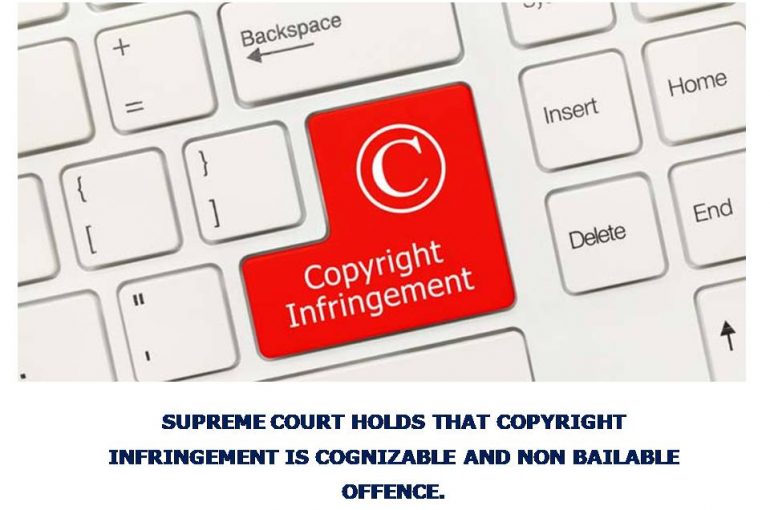SUPREME COURT HOLDS THAT COPYRIGHT INFRINGEMENT IS COGNIZABLE AND NON BAILABLE OFFENCE
In a recent Criminal Appeal, a two Judge Bench of the Supreme Court comprising of Justice M.R Shah and Justice B.V Nagarathna passed an Order and Judgement dated 20.05.2022 in ‘M/s Knit Pro International vs The State of NCT of Delhi & Anr.’ (Criminal Appeal No. 807 of 2022) and set aside the Order dated 25.11.2019 (Impugned Order) passed by the High Court of Delhi and held that Copyright Infringement is a cognizable and non bailable offence.
In the present case, the Appellant- original Complainant filed an Application under Section 156 (3) (Any Magistrate empowered under section 190 may order such an investigation as above mentioned) of Code of Criminal Procedure (CrPc.) and sought directions from the Chief Metropolitan Magistrate (CMM) for registration of FIR against the Respondent No.2- original Accused under Sections 51 (When copyright is infringed), 63 (Offence of infringement of copyright or other rights conferred by this Act), 64 (Power of police to seize infringing copies) of the Copyright Act, 1957 with Section 420 (Cheating and dishonestly inducing delivery of property) of Indian Penal Code, 1860 (IPC). Learned CMM vide Order dated 23.10.2018, allowed the said Application and a direction was passed to the concerned Station House Officer (SHO) to register a FIR under appropriate provisions of law. In compliance with the Order dated 23.10.2018, an FIR No. 431 of 2018 was registered in PS Bawana.
Feeling aggrieved by the Order dated 23.10.2018, the Respondent No.2 –original Accused filed a Writ Petition (Crl.) No. 3422 of 2018 before the Hon’ble High Court of Delhi. The Accused prayed for quashing the criminal proceedings pending against them under Section 63 of the Copyright Act as the same was not cognizable and non-bailable offence. The High Court vide Impugned Order dated 25.11.2019, allowed the said Writ Petition and quashed the criminal proceedings by holding that offence under Section 63 of Copyright Act is a non-cognizable offence.
Feeling dissatisfied by the Impugned Order dated 25.11.2019 passed by the High Court, the Appellant- original Complainant preferred a Criminal Appeal before the Hon’ble Supreme Court. The counsel for the Appellant contended that the High Court has committed a grave error in quashing the criminal proceedings and holding that offence under Section 63 of Copyright Act is not a cognizable offence. The counsel further submitted that the said offence would fall under Part II of the First Schedule of the Cr.PC.
The counsel for the Respondent No.2 relied on ‘Rakesh Kumar Paul vs. State of Assam, (2017) 15 SCC 67’ and submitted that the aforesaid decision holds the expression ‘not less than 10 years (Punishment)’ therefore the offence would fall under the ambit of Section 167(2) (a)(i) of Cr.PC as the maximum punishment under Section 63 of Copyright Act is 3 years.
The Apex Court after hearing the counsel of both the parties observed that, considering Part II of the First Schedule of the Cr.PC., if the offence is punishable with imprisonment for 3 years and onwards but not more than 7 years the offence is a cognizable offence. Only in the case where the offence is punishable for imprisonment for less than 3 years or with fine only the offence can be said to be non-cognizable. The Supreme Court further observed that, the High Court while passing the Impugned Order 25.11.2019 has committed a grave error by quashing the FIR and by holding that the offence under Section 63 of Copyright Act is a non-cognizable offence and bailable.
Thus the Supreme Court held that the offence under Section 63 of Copyright Act is cognizable and non-bailable offence, thereby setting aside the Impugned Order dated 25.11.2019 of the High Court and restoring the criminal proceedings against the Respondent No.2 for offence under Section 63 and 64 of Copyright Act treating the same as cognizable and non-bailable offence.
Varnim Gupta
Legal Associate
The Indian Lawyer





































Leave a Reply